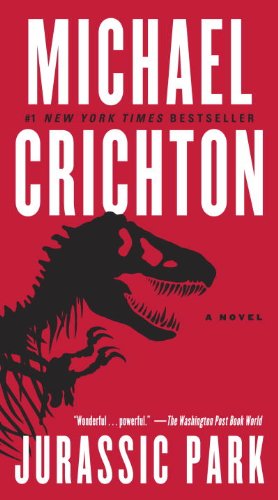
![]() Jurassic Park by Michael Crichton
Jurassic Park by Michael Crichton
In our Edge of the Universe column we review mainstream authors that incorporate elements of speculative fiction into their “literary” work. However you want to label them, we hope you’ll enjoy discussing these books with us.
It’s difficult to talk about Michael Crichton’s Jurassic Park, though not because the novel’s plot and characters are especially complex. They aren’t.
Alan Grant is a paleontologist who is asked to vet a new theme park that has brought dinosaurs back to life. The dinosaurs escape, and Grant, human resourcefulness, and state of the art technology are pitted against the raw power of Jurassic era biology. It’s a simple premise, though it is also undeniably compelling.
Instead, Jurassic Park is difficult to talk about because it is overshadowed by its film adaptation. I have never once managed to mention this novel without the conversation digressing into recollections about the first time I saw the movie. (In my case, I was lucky enough to watch it as a kid in the theater.) So I tend to classify Jurassic Park as one of those stories for which the movie was better than the book.
Ironically, if not for the film, Jurassic Park would more commonly be remembered as Michael Crichton’s masterpiece. Crichton’s previous techno thriller, Sphere, had everything we could expect from Michael Crichton, including: an unusual team of academics, futuristic yet familiar technologies clearly explained to us, and a distant and adventurous setting. Readers could have easily walked away from that novel thinking that Crichton would spend the remainder of his career futilely trying to match his achievement in Sphere.
But with Jurassic Park, Crichton has consistently traded up. Mathematicians are cool, but rock star mathematicians like Ian Malcolm are even cooler. Malcolm not only explains why we should wear black clothing, but also introduces us to chaos theory. Malcolm guarantees that the dinosaurs will escape, which is one of the best uses of mathematics to generate suspense that I’ve ever encountered.
Alien technology is pretty nifty, but what about cloning technology? It’s not only hip, but also real enough to allude to ethical dilemmas that we were already reading about in magazines.
The ocean floor seemed dangerous, but how about a remote Caribbean island in the middle of a hurricane?
And let’s not forget about the most important trade of all: dinosaurs are substituted for squids.
Who could have seen this coming?
Actually, anyone.
What’s impressive about these substitutions is that Crichton has improved his formula by returning to the same playbook from which he seems to have gotten all of his ideas: adventure stories written around the turn of the century. Arthur Conan Doyle’s The Lost World has replaced Jules Verne’s 20000 Leagues Under the Sea. I can’t help but wonder how much Crichton’s childhood library card would catch at an auction. He certainly made it pay.
At this point, the question seems to become whether or not we should still read Jurassic Park. It seems wrong to apply this question to one of the greatest techno thrillers ever written. Nevertheless, the strength of Crichton’s work has always been the plot, as opposed to the prose or the characterization. Because the film is faithful enough to the novel that readers will find themselves feeling as though the velociraptors are old friends rather than deadly adversaries, some readers may well be justified in opting not to read this one.
Still, for Crichton fans, Jurassic Park is a must.



My brother-in-law were just talking about this book and Crichton yesterday.
I actually don’t think the movie is all that faithful to the book. Changing the character of Hammond from a greedy tycoon to a kindly grandpa kind of Spielbergs it up a bit too much for me. I think the book very much deserves to be read. And I say that as a non-Crichton fan — this is the only one of his I’ve actually finished.
I devoured “Jurassic Park” for a couple of heart-pounding days, finishing it just weeks before the movie hit theaters. It’s been a while, so I can’t recall how faithful to the book the movie was, but again, I was on the edge of my seat (screaming aloud at two points) for the duration. It still has the power to freak me out even though I know what’s coming. For me, this is a case in which both the book and the movie are on equal footing as far as impact, though I usually prefer reading a book before its movie so I can use my own imagination. Definitely one of my all-time favorite reads.